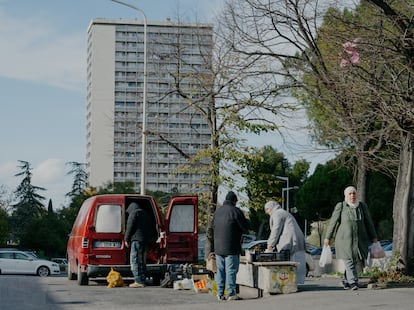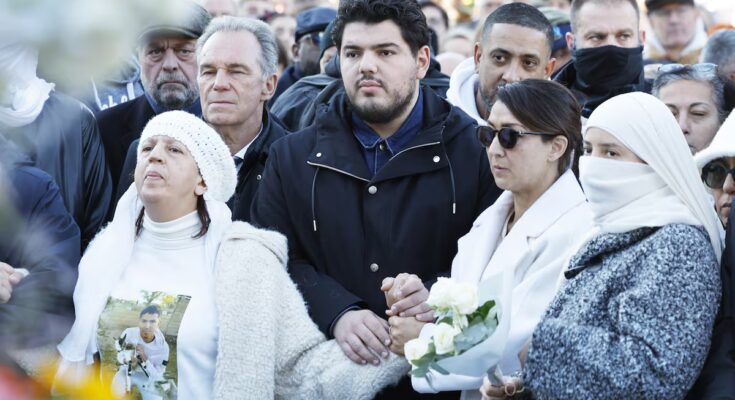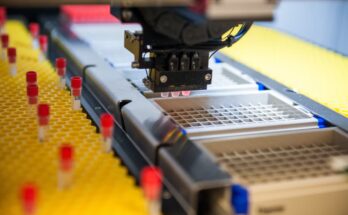The story is long and full of bloody chapters, historical names of organized crime, literature and cinema. But Marseille, the second largest city in France by population (850 thousand inhabitants), capital of organized crime, can no longer take it. This Saturday, around 6,200 people, according to the police, took to the streets dressed in white in the largest protest in memory against drug trafficking and to denounce the murder of Mehdi Kessaci, brother of a politician and anti-drug activist nine days ago. A turning point that takes the city back to the 1980s, times in which the city mafia challenged the state and assassinated judge Pierre Michel. “We speak because we know that silence kills,” the victim’s brother said emotionally.
History now repeats itself in its wildest version. On Thursday 13 November, two gunmen aboard a motorcycle shot Mehdi Kessaci, 20, as he parked his car in the fourth arrondissement, north of Marseille. He was the brother of Amine Kessaci, a well-known activist and resident of one of the northern neighborhoods of Marseille, the most conflicted and gangrenous due to drug trafficking. The police are still investigating the case and the killers are still at large. But the main hypothesis is that of a murder ordered from prison by one of the leaders of the DZ mafia. A “crime of intimidation”, as the Minister of the Interior, Laurent Nuñez, defined it. A further step towards the consolidation of a hegemonic and mafia regime imposed by the gangs.
France interpreted it as a “challenge to the state”, according to Nuñez himself. And at the demonstration, right where Mehdi was murdered, the president of the National Assembly, Yaël Braun-Pivet, was present “to affirm national unity in the fight against drug trafficking”. But the city’s mayor, Bonoît Payan, and other left-wing politicians, such as Olivier Faure and Boris Vallaud (PS), Marine Tondelier (The Ecologists) and François Ruffin, also traveled to Marseille and participated in the protest amid shouts of “justice for Mehdi”. “We need social justice, commitment from the state and local administrations, as well as support for the associations that carry out the work every day with very few resources,” said Amine Kessaci in his speech.
The march aimed, among other things, to counteract the already palpable effect of the murder: silence, fear and silence. Many of the activists working in problem neighborhoods, such as educators, mediators or lawyers, have decided not to appear in the media anymore for fear of retaliation. “This murder represents the failure of our State and Europe to guarantee the protection of its citizens. Amine was a politician who fought against drug trafficking. And attacking a politician and his family in France means attacking the State. We will take a step back, we will not be able to speak in public. If the fight continues, it will have to be anonymous and discreet so as not to create problems”, explains the lawyer who requests anonymity.
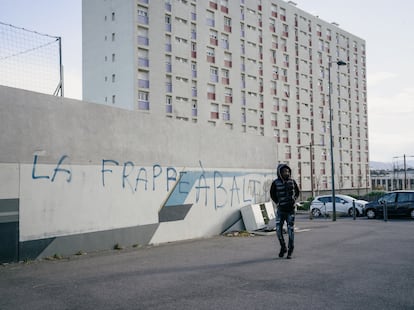
Mahdi’s killers have not been arrested. The motorcycle was found burned far from the scene of the murder. There aren’t too many clues. But the first investigations point to Amine O., known as Mamine or Jalisco, one of the leaders of the DZ mafia. The criminal is in a maximum security prison, but it is suspected that he may have organized the crime from prison, as is usually the case.
The situation is “serious”, recognizes the deputy mayor of Marseille, Pierre Huguet, in conversation with El PAÍS. “It is an unprecedented turning point in Marseille, reminiscent of the 1980s with the murder of Judge Michel. The situation is very worrying. The mayor, from the beginning of his mandate, has asked for additional justice and police tools to effectively fight against drug trafficking”, he underlines before expanding the problem to the whole of France. “Today the issue of drug trafficking is national, not just Marseille. But security and the fight against drug trafficking are a state responsibility”, he clarifies, indicating cities such as Grenoble, Nîmes or Toulouse, deeply affected by the phenomenon.
La Castellane (the neighborhood where Zinedine Zidane was born), La Paternelle, La Savine, Les Rosiers or Frais Vallone, the neighborhood where the Kessaci brothers grew up, a few minutes from the place where Medhi was murdered. For a time they were impregnable territory for the police or anyone who did not intend to buy drugs. In recent years, two rival gangs have fought a bloody war that has left nearly a hundred dead: the DZ mafia (DZ refers to the word Algeria in Arabic and Berber) and Yoda. The result was the disappearance of the seconds and a certain pacification of their old headquarters. “The murders have decreased, but the sense of impunity of this organization has grown,” say police sources.
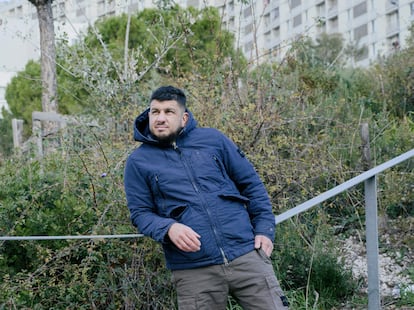
Marseille, the second most populated city in the country with 850,000 inhabitants, is today a city divided in half: a poor north, the so-called northern neighborhoodsand a relatively wealthy south. Half of the inhabitants of 41 neighborhoods can be considered poor. Beyond security, the City Council has the power to work at a social level, as associations such as APIS, led by mediator Momo Benmedoour, tirelessly do. An activist for 13 years, he walks around neighborhoods, talks to young people, offers them alternatives to drug trafficking and supervises their time in prison if they end up committing a crime. He was at the front of the protest on Saturday. “There is too much talk about them. They are young people that we have all seen growing up. Some have committed very serious acts, but most are dead or in prison. They exist, of course. But it is an organization that has existed for two years and we do not know the power it has. The problem is that they enter into these crimes because they are disoriented children, living in deplorable, unhealthy conditions, and many without a father at home. The mother cleans other houses or lives with help, and when the little one grows up there and sees traffic as an adult, he thinks that is the only means you have to prosper,” he emphasizes.
Even Momo, who claims not to be afraid, underlines the gravity of the moment. “It’s a threat to everyone and everyone is nervous. It’s the Cosa Nostra method in the ’80s, when they attacked journalists, politicians, judges… And they did it so that people wouldn’t talk, so that there would be no regrets.” For now, Marseille continues to stand up and raise its voice to avoid normalizing the mafia.
